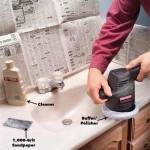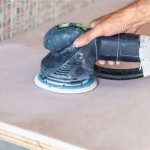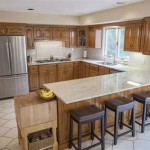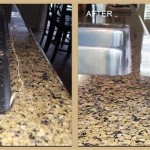How Much Does It Cost to Replace a Bathroom Countertop?
Replacing a bathroom countertop can significantly enhance the aesthetic appeal and functionality of a bathroom space. However, understanding the associated costs is crucial for budgeting and making informed decisions. The total expense involved in a bathroom countertop replacement project can vary substantially based on several factors, including the material chosen, the size and complexity of the countertop, labor costs, and regional price differences.
This article provides a comprehensive overview of the diverse elements contributing to the overall cost of replacing a bathroom countertop, offering insight into material costs, labor considerations, and potential ancillary expenses to empower homeowners with the knowledge necessary for successful project planning.
Material Costs: A Primary Driver of Price
The material selected for the bathroom countertop is arguably the most significant factor influencing the overall cost. Different materials possess unique characteristics, aesthetic qualities, and price points, leading to a wide range of budget options. Common countertop materials include laminate, tile, solid surface, quartz, granite, marble, and concrete. Each material exhibits varying levels of durability, maintenance requirements, and visual appeal, further impacting the decision-making process.
Laminate countertops are generally the most affordable option, offering a wide array of colors and patterns. The cost of laminate typically ranges from $15 to $40 per square foot installed. Laminate is a manufactured material consisting of a thin decorative layer bonded to a particleboard or MDF core. While cost-effective, laminate is susceptible to scratches, stains, and water damage, especially at the seams. Therefore, the longevity and overall value proposition may be lower compared to more durable options.
Tile countertops offer a versatile and customizable aesthetic, allowing for intricate designs and unique patterns. The cost of tile countertops can vary significantly depending on the type of tile used, ranging from $20 to $75 per square foot installed. Installation complexity and the cost of grout and sealant also contribute to the overall price. While tile is durable and water-resistant, grout lines can be prone to staining and require regular maintenance.
Solid surface countertops, such as Corian, are a mid-range option known for their seamless appearance and repairability. Solid surface materials consist of acrylic or polyester resins mixed with mineral fillers. The cost of solid surface countertops typically ranges from $40 to $100 per square foot installed. Solid surface is non-porous, making it resistant to stains and bacteria growth. However, it can be susceptible to scratches and heat damage.
Quartz countertops have gained significant popularity in recent years due to their durability, low maintenance, and wide range of color options. Quartz is an engineered stone composed of crushed quartz crystals bound together with resin. The cost of quartz countertops typically ranges from $50 to $150 per square foot installed. Quartz is highly resistant to scratches, stains, and heat, making it a practical and aesthetically pleasing choice for bathroom countertops.
Granite countertops are a natural stone option known for their unique patterns and durability. Granite is a porous material that requires sealing to prevent staining and bacteria growth. The cost of granite countertops typically ranges from $45 to $200 per square foot installed, depending on the grade and availability of the stone. Granite is highly heat-resistant and adds a touch of luxury to any bathroom.
Marble countertops are another natural stone option prized for their elegant appearance and veining patterns. Marble is a softer and more porous stone than granite, making it more susceptible to scratches, stains, and etching. The cost of marble countertops typically ranges from $75 to $250 per square foot installed, depending on the quality and rarity of the marble. Marble requires diligent sealing and maintenance to preserve its beauty.
Concrete countertops offer a modern and industrial aesthetic, providing a unique and customizable option. Concrete countertops can be cast in place or pre-cast, allowing for various shapes, sizes, and finishes. The cost of concrete countertops typically ranges from $75 to $150 per square foot installed. Concrete is a porous material that requires sealing to prevent staining and cracking. It also demands specialized installation techniques.
Labor Costs: Professional Installation vs. DIY
Labor costs constitute a significant portion of the overall expense of replacing a bathroom countertop. Professional installation ensures proper fitting, sealing, and plumbing connections, minimizing the risk of future problems. The cost of labor varies depending on the complexity of the installation, the geographic location, and the experience of the contractor.
The removal of the existing countertop typically costs between $50 and $200, depending on the size and material of the countertop and the ease of access. Disposal fees may also apply. Preparing the base cabinets for the new countertop involves ensuring they are level and structurally sound, which can require additional work and cost extra if repairs are needed.
Installation of the new countertop can range from $30 to $100 per linear foot, depending on the material and the complexity of the installation. Materials like granite and quartz often require specialized tools and expertise, increasing labor costs. The installation process involves measuring, cutting (if necessary), fitting, and securing the countertop to the base cabinets.
Plumbing work is almost always required, especially if the sink and faucet are being replaced along with the countertop. Plumbers typically charge between $75 and $150 per hour, and the cost of plumbing work can include disconnecting and reconnecting the water supply lines, drain pipes, and installing new faucets. Complex plumbing configurations may require additional time and expense.
Opting for a do-it-yourself (DIY) approach can potentially save on labor costs, but it requires a significant investment of time, skills, and tools. Improper installation can lead to costly mistakes, such as leaks, cracks, or structural damage. For complex installations or when working with materials like natural stone, professional installation is highly recommended to ensure a high-quality and long-lasting result.
Ancillary Expenses: Hidden Costs to Consider
In addition to material and labor costs, several ancillary expenses can influence the total cost of a bathroom countertop replacement project. These expenses should be factored into the budget to avoid unexpected surprises.
New sink and faucet fixtures are often installed alongside the countertop, providing an opportunity to update the bathroom's aesthetic and functionality. The cost of a new sink can range from $50 to $500 or more, depending on the style, material, and brand. Faucet prices can range from $50 to $1000 or more, depending on the design, features, and finish. Installation of new fixtures will add to the plumbing labor cost.
Backsplashes protect the wall behind the countertop from water damage and add a decorative element to the bathroom. The cost of a backsplash can range from $5 to $50 or more per square foot, depending on the material (tile, glass, stone), the design, and the installation complexity. A simple tile backsplash can be a cost-effective way to enhance the look of the countertop.
Edge profiling adds a decorative touch to the countertop edge, enhancing its visual appeal. Different edge profiles, such as bullnose, ogee, or beveled edges, can add to the material cost, particularly for natural stone countertops. The cost of edge profiling can range from $10 to $50 per linear foot, depending on the complexity of the profile.
Structural repairs to the base cabinets may be necessary if they are damaged or not level. Repairing or replacing damaged cabinets can add significantly to the overall cost of the project. It is advisable to inspect the cabinets thoroughly before starting the countertop replacement project.
Permits may be required for plumbing work or structural modifications, especially in certain jurisdictions. The cost of permits can vary depending on the location and the scope of the work. Failing to obtain necessary permits can result in fines and project delays.
Disposal fees for the old countertop and other construction debris can also contribute to the overall expense. Some contractors include disposal fees in their quotes, while others charge them separately. It is important to clarify this aspect with the contractor before commencing the project.
Beyond the direct costs, consider the potential disruption to daily life during the replacement process. The bathroom may be unusable for a period, and dust and noise can be disruptive. Planning for alternative bathroom arrangements during the project will minimize inconvenience.
Contingency funds should be set aside to cover unexpected issues or changes that may arise during the project. A contingency fund of 10-15% of the total project cost is recommended to address unforeseen problems, such as hidden damage or unexpected plumbing complications.

How Much Does It Cost To Replace Bathroom Countertops Contractor Source

2024 Cost To Replace Bathroom Countertop A Guide

How To Replace A Bathroom Countertop Homeadvisor

Bathroom Vanity Installation Cost 2024 Average S

Cost Of Bathroom Granite Countertops S In 2024 Marble Com

2024 Cost To Replace Bathroom Countertop A Guide

Diy Vanity Tops For Your Bathroom

Replace Granite Countertops Transform Your Bathroom S Look

Best Types Of Bathroom Countertops Modernize

Bathroom Countertop Dad S Construction Best Local Contractor
See Also








